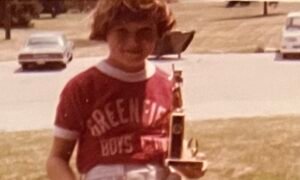My 8th grade daughter got into her school’s writing club today. She texted me the news, complete with a great deal of capitalization and too many exclamation points. (I’m sure they’ll work on that during their first meeting.) It was a good day for us. This small victory has been a long time coming.
Since we arrived in our new town, Mary Claire tried out for the volleyball team. (She didn’t make it.) She auditioned for a part in a community theatre production. (She didn’t get one.) She tried out for pop/swing choir. (No spot for her there.) She taught herself the ukulele and auditioned for the junior high talent show. (Nope.)
It has been a month of disappointment for my ambitious girl. If I never again have to see her walk away from a posted list — one sans her name — with shoulders slumped and head down, I will be a happy Mama.
I get that there are lessons to be learned in facing disappointment. I understand. But it was a long, tough month. And she’s 13.
When she told me she was trying out for the writers club, my heart jumped and sank simultaneously. She’s a talented writer, my girl. But she had to try out. Again. When adults arbitrarily set the bar for “who’s good enough,” it’s a tough target to hit. She wrote the best damn short story she could write. And she waited.
The news today was bittersweet. I’m so happy Mary Claire has a place now. As the new girl in town, she needed a group to call her own. But there are others who still haven’t found that place. Today, there are kids looking at that posted writers club list with slumped shoulders and hanging heads.
There are only so many spots on a volleyball team. Okay.
If too many kids are dancing onstage in a choreographed pop/swing number, it’s a recipe for disaster. Understood.
A musical cast only has so many characters. Got it.
But the talent show? The writers club?
If an 11, 12, or 13-year-old has the balls to get onstage and play a piano piece or sing a song or perform a magic act, then I say, “LET HIM DO IT.” Does the level of talent really matter at this stage? Isn’t it more about ambition and courage and fun? About the thrill of the experience? So, you need to have three nights of talent shows to accommodate all the kids? Great. Give them each a 2-minute time limit, but get them onstage. I’ll help. I’m happy to coordinate nights two and three.
If an 11, 12, or 13-year-old has the gumption to share her sacred words on paper, then LET HER WRITE. Worried about too many kids knocking down the writers club door? (What a fantastic problem to have!) Enlist some parents. I would happily critique essays, mentor writers, plan gatherings.
George played recreational soccer for the first time in five years this year. He had one unremarkable season as a 6-year-old, then he tried some other activities. When we moved, he decided he’d like to play again. It was an opportunity for him to exercise, make new friends, run around like 11-year-old boys do. Let me repeat: We signed him up for a recreational league.
Before the start of the season, his coach called me. “I noticed on your player form that George has not played for quite a few years,” he said. “These kids have all been playing soccer for a long time. Do you think he’ll be able to keep up?” I think George’s coach was genuinely concerned about George. I’m going to believe that was his intention in calling. He’s proven to be a great encouragement and source of happiness for my boy. But really? He’s 11. It’s a rec league.
I know I sound like a 103-year-old curmudgeon (You kids get off my lawn!) when I wax poetic about the good old days — the days when it seemed there were more opportunities for kids to explore their interests and discover their talents. But when I was a pre-teen, I rode my bike to the Boys & Girls Club every day. I signed up for baseball, for basketball, for whatever sport was currently available. I tried to be a Brownie (until I got kicked out for talking about boys). I wrote. I sang. I found out that I could fire a baseball from center field to catcher with speed and accuracy, but that I was fairly likely to drown if required to swim more than one lap. (“Why are you punching the water?” Chris always asks when he sees me in the pool. “A little grace, a little finesse. Don’t fight the water — work with it.” I was not destined to be Diana Nyad.)
My point is this: I’m 43 and I’m still discovering who I am. Why aren’t we giving our kids the same freedom to explore — without squashing their spirits? I’m not a member of the “Every Kid Gets a Trophy” camp. I do believe in competition — at certain levels. But we’re not talking about applications to Harvard here. We’re talking about recreational sports and kids who want to find out if they like singing, dancing, writing. Why aren’t we a little more concerned about growing human beings than creating Tony award winning junior high musicals?
To me, all of this seems like a microcosm of a bigger societal problem. If you have enough innate talent, enough money for elite camps and lessons, enough time to devote solely to your chosen endeavor, you get to participate. If not, you don’t. The rich get richer; the poor get left behind. (I mean that both literally and metaphorically.) And it’s beginning far too early. Malcolm Gladwell talks about the “10,000 hours” it takes to become a master musician, athlete, inventor. He discusses how success is a combination of hard work, time, effort, and external opportunity and support — that no man is an island. We depend and rely on each others to lift us.
I’m a writer today because I was encouraged in my endeavors. I can still vividly remember Mr. Hawkins telling me my 9th grade essay was beautifully developed — one of the best he’d ever read. If I’d been turned away from writers club at age 12 because my application essay wasn’t deemed “good enough,” I might have gone to medical school instead. And then God help us all.
And yes, I see the opportunity in disappointment, too. Because Mary Claire didn’t make the volleyball team, she tried out for the writers club. (Although I believe in her case, she still would have chosen both.) We are challenged to discover new paths when the one we’re on turns abruptly into a dead end. I just think the dead ends are happening too soon — and too often — for today’s kids.
I know there are no easy answers — and often times, there are not enough resources. But I think we need to make a fundamental shift in how we view our children and their opportunities for growth. Instead of closing so many doors so early, let’s talk about opening a few more instead.





9 Responses
Your essay is “beautifully developed — one of the best he’d ever read.” I am in full agreement with you, Katrina. Thank you for speaking up for your kids and for other kids who need to know they’re a part of a large, inclusive team called the “good enoughs.” … Sandra
*Correction: One of the best I’ve ever read.” 🙂
It’s still early for me. Have a lovely day!
I love this post. I wish the focus was less on winning on more on learning and building each other up, no matter what the past-time. We had a little league game last season where we were one kid short, so the one coach asked the other if we could “borrow” someone and just let the kids play/practice, even though the game wouldn’t “count.” I was appalled when parents took their kids home and wouldn’t let them play. The kids just wanted to play ball. Terribly lost opportunity for multiple good life lessons in my opinion. But then I was the kid who just panicked whenever people came rushing at me because I had the ball in soccer, or when softballs came hurtling toward me at lightning speeds. I was more of a gymnastics/dancing/artsy girl for that reason ;). Thanks for writing 🙂 –Lisa
To my shame, I discouraged my nine-year-old from trying two sports recently because when he last tried them at age 6 he wasn’t very good and didn’t try. All of his friends have been playing and practicing regularly since then, and I didn’t want him to be horrible and hate every practice and game, which would be miserable for both us of when I’d make him stick with it. I don’t think a kid should be pigeon-holed by his 6-year-old interests and abilities, but that seems to be how it works here in suburbia.
I wish there didn’t need to be sports leagues at all, and that kids would just play pick-up games in the neighborhood. We schedule play dates and we organize sports. I fear our kids are going to lack initiative and creativity (or that someone will tell them they do and keep them out of writing club).
Thank you for voicing my thoughts so articulately in this post.
Brava, you!
Thank you for putting this point of view into such beautiful words.
I so, so agree with you Katrina! Why make things like Writer’s Club and participating in a Talent Show competitive? Wow. I had the same frustrations when one of my daughters was younger, and she tried out for a 7th grade cheerleading team. I wouldn’t let her do cheerleading at a younger age because it seemed to sexualize the girls so young. But then she didn’t make it when she tried out at age 12. But really, it made no sense for me that the girls who weren’t thrown into cheerleading from 1st grade on (or younger), didn’t get a chance to practice at it when they first had the opportunity at school, at least for a couple years before having to try out. So glad your daughter got in the Writer’s Club!
This is one of the things I love about homeschool – You want to take a course in forensics? Sure! Want to learn manga drawing? Sure!
I agree wholeheartedly that school years should be about experimentation and exploration. Kids should be generalists, trying their hand at everything they possibly can. Even if they decide that’s not the career path for them, it open doors/minds/hearts to other worlds. Education should be about learning how to learn and learning how to appreciate the world around you.
It’s sad to hear that your daughter was turned away from the musical and talent shows. i produce an annual theatre production and every year there are kids we don’t cast. To every one of them though we suggest they come and work backstage, or help out with sets or costumes. There are plenty of ways to involve kids who don’t end up on stage. The other thing we stress is that no cast ever makes it on stage without the hard work of the crew. People get really hung up about getting lead roles, but for every lead actor who looks good, there are probably twenty people who go them there.
I agree – let them all in! As they get older the kids that have been learning a skill for longer naturally keep getting chosen and the ones that haven’t had a chance to try get further behind. What I’ve noticed too is that even when a sport is graded, the best teams get the best coaches so that those kids who need more coaching, get less. It’s upside down!